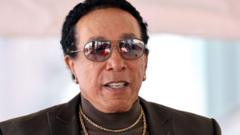In a striking turn of events, a planned Trump-branded hotel and apartment complex in Belgrade is facing significant opposition from cultural preservationists, sparking a criminal investigation into local officials associated with the controversial project. The brainchild of Jared Kushner, President Trump's son-in-law, the development seeks to erect a half-billion-dollar complex in a location long considered a symbol of Serbian suffering from the 1999 conflict.
After narrowly securing reelection, President Trump’s administration saw the Serbian government quickly expedite the project's approval by lifting the cultural protection status of the bombed-out site. This decision, however, was met with fierce backlash from architects and cultural historians at Serbia's Republic Institute for the Protection of Cultural Monuments, who argued that the site should remain protected.
In their protest, the experts contended that the revocation of cultural status required expert validation, which they asserted had not occurred. "We knew from the start that this was a politically motivated decision," commented Estela Radonjic Zivkov, a former deputy director at the institute. Despite facing pressure from government agents, she and her colleagues proceeded to voice their objections, underscoring the intense political undercurrents driving the project forward.
This ongoing saga not only highlights the complexities of international business dealings influenced by political power but also reveals the resilience of local communities in safeguarding their cultural heritage. As the investigation unfolds, the Trump organization may find itself entwined in a web of legal and ethical challenges while attempting to navigate the intricate landscape of both Serbian and American politics.
After narrowly securing reelection, President Trump’s administration saw the Serbian government quickly expedite the project's approval by lifting the cultural protection status of the bombed-out site. This decision, however, was met with fierce backlash from architects and cultural historians at Serbia's Republic Institute for the Protection of Cultural Monuments, who argued that the site should remain protected.
In their protest, the experts contended that the revocation of cultural status required expert validation, which they asserted had not occurred. "We knew from the start that this was a politically motivated decision," commented Estela Radonjic Zivkov, a former deputy director at the institute. Despite facing pressure from government agents, she and her colleagues proceeded to voice their objections, underscoring the intense political undercurrents driving the project forward.
This ongoing saga not only highlights the complexities of international business dealings influenced by political power but also reveals the resilience of local communities in safeguarding their cultural heritage. As the investigation unfolds, the Trump organization may find itself entwined in a web of legal and ethical challenges while attempting to navigate the intricate landscape of both Serbian and American politics.



















